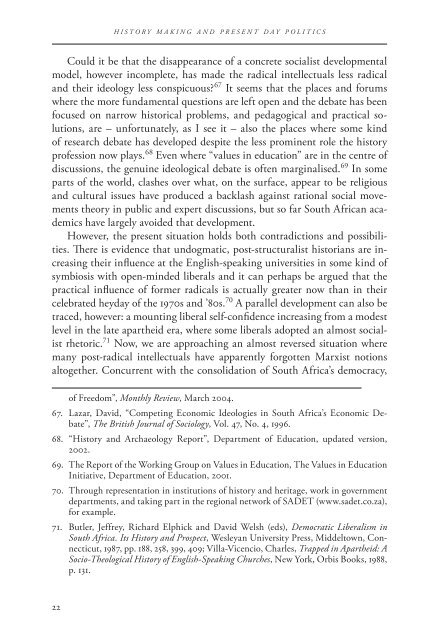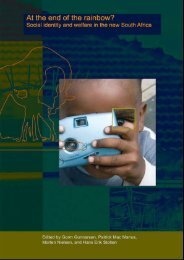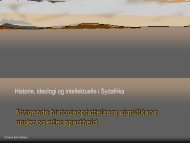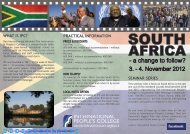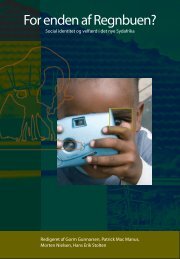History Making and Present Day Politics - Stolten's African Studies ...
History Making and Present Day Politics - Stolten's African Studies ...
History Making and Present Day Politics - Stolten's African Studies ...
You also want an ePaper? Increase the reach of your titles
YUMPU automatically turns print PDFs into web optimized ePapers that Google loves.
h i s t o r y m a k i n g a n d p r e s e n t d a y p o l i t i c s<br />
Could it be that the disappearance of a concrete socialist developmental<br />
model, however incomplete, has made the radical intellectuals less radical<br />
<strong>and</strong> their ideology less conspicuous? 67 It seems that the places <strong>and</strong> forums<br />
where the more fundamental questions are left open <strong>and</strong> the debate has been<br />
focused on narrow historical problems, <strong>and</strong> pedagogical <strong>and</strong> practical solutions,<br />
are – unfortunately, as I see it – also the places where some kind<br />
of research debate has developed despite the less prominent role the history<br />
profession now plays. 68 Even where “values in education” are in the centre of<br />
discussions, the genuine ideological debate is often marginalised. 69 In some<br />
parts of the world, clashes over what, on the surface, appear to be religious<br />
<strong>and</strong> cultural issues have produced a backlash against rational social movements<br />
theory in public <strong>and</strong> expert discussions, but so far South <strong>African</strong> academics<br />
have largely avoided that development.<br />
However, the present situation holds both contradictions <strong>and</strong> possibilities.<br />
There is evidence that undogmatic, post-structuralist historians are increasing<br />
their influence at the English-speaking universities in some kind of<br />
symbiosis with open-minded liberals <strong>and</strong> it can perhaps be argued that the<br />
practical influence of former radicals is actually greater now than in their<br />
celebrated heyday of the 1970s <strong>and</strong> ’80s. 70 A parallel development can also be<br />
traced, however: a mounting liberal self-confidence increasing from a modest<br />
level in the late apartheid era, where some liberals adopted an almost socialist<br />
rhetoric. 71 Now, we are approaching an almost reversed situation where<br />
many post-radical intellectuals have apparently forgotten Marxist notions<br />
altogether. Concurrent with the consolidation of South Africa’s democracy,<br />
of Freedom”, Monthly Review, March 2004.<br />
67. Lazar, David, “Competing Economic Ideologies in South Africa’s Economic Debate”,<br />
The British Journal of Sociology, Vol. 47, No. 4, 1996.<br />
68. “<strong>History</strong> <strong>and</strong> Archaeology Report”, Department of Education, updated version,<br />
2002.<br />
69. The Report of the Working Group on Values in Education, The Values in Education<br />
Initiative, Department of Education, 2001.<br />
70. Through representation in institutions of history <strong>and</strong> heritage, work in government<br />
departments, <strong>and</strong> taking part in the regional network of SADET (www.sadet.co.za),<br />
for example.<br />
71. Butler, Jeffrey, Richard Elphick <strong>and</strong> David Welsh (eds), Democratic Liberalism in<br />
South Africa. Its <strong>History</strong> <strong>and</strong> Prospect, Wesleyan University Press, Middeltown, Connecticut,<br />
1987, pp. 188, 258, 399, 409; Villa-Vicencio, Charles, Trapped in Apartheid: A<br />
Socio-Theological <strong>History</strong> of English-Speaking Churches, New York, Orbis Books, 1988,<br />
p. 131.<br />
22


